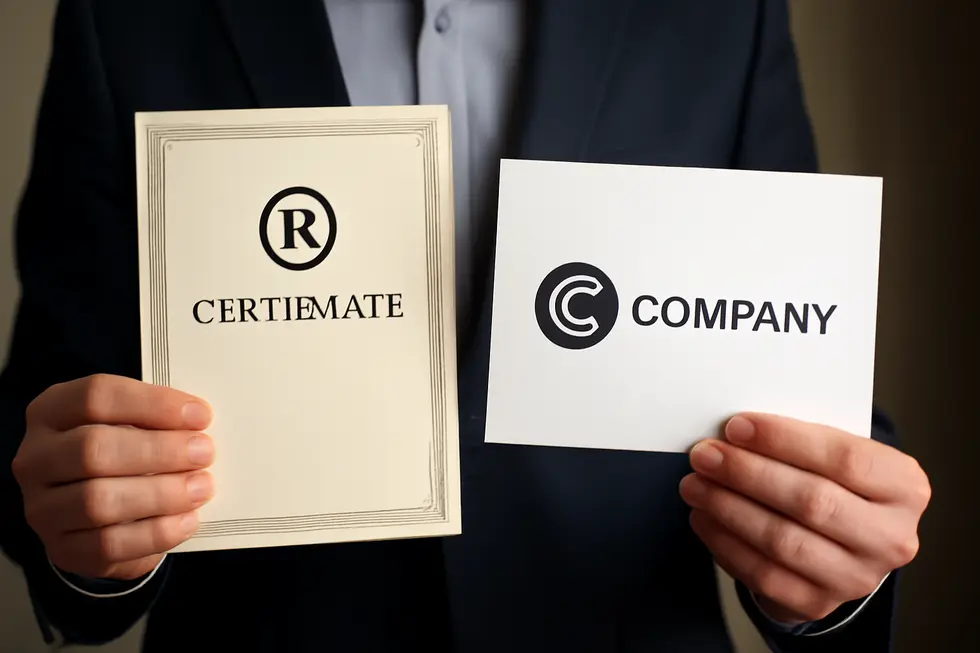Introduction
Choosing a company name is a foundational step in establishing your business identity, but it often raises an important question: can you name your company the same as another? This question is especially vital for business owners seeking to avoid legal pitfalls and protect their brand. The answer is not straightforward, as it involves various legal restrictions, trademark issues, and jurisdictional nuances. The first chapter explores the strict legal frameworks that govern company name registrations and explain why identical names are usually prohibited. The second chapter examines trademark laws that protect brand identity and how they intersect with company names to prevent commercial confusion. The final chapter highlights practical considerations and jurisdictional variations, helping business owners navigate the complexities of naming their companies while safeguarding their brand. Together, these chapters offer a comprehensive view designed to help business owners make informed naming decisions.
Tables of Contents
Chapter 1: Can I Name My Company the Same as Another: Legal Restrictions on Company Names
- Navigating Jurisdictional Rules: Why Your Company Name Must Be Unique Within Its Territory
- Navigating Company Name Registration and Trademark Protections: Why Distinctiveness Matters
- Navigating Legal Boundaries: How Similar Company Names Can Lead to Consumer Confusion and Disputes
Chapter 2: Can I Name My Company the Same as Another: Trademark Implications and Brand Identity Protection
- Navigating Trademark Searches and Avoiding Consumer Confusion When Naming Your Company
- Navigating Legal Risks and Enforcement Tactics When Naming Your Company Like Another
- Navigating Brand Identity and Trademark Risks When Naming Your Company
Chapter 3: Can I Name My Company the Same as Another: Practical Considerations and Jurisdictional Variations
- Navigating Legal and Trademark Barriers When Naming Your Company Similar to Another
- Understanding Jurisdictional Complexities and Enforcement in Naming Conflicts
- Navigating Naming Conflicts: Effective Strategies When Your Company Name Faces Legal and Commercial Challenges
Chapter 1: Can I Name My Company the Same as Another: Legal Restrictions on Company Names

1. Navigating Jurisdictional Rules: Why Your Company Name Must Be Unique Within Its Territory
When registering a company, it is crucial to understand that duplicating an existing company’s name within the same jurisdiction is generally prohibited. This restriction serves to protect consumers and businesses alike by preventing confusion over company identities. Registration authorities rigorously evaluate proposed business names and refuse those that are identical or confusingly similar to names already registered in the same legal domain, even if the entities operate in different industries. The rationale behind this is to maintain clear distinctions in the marketplace and uphold trust.
Trademark law adds a powerful layer of protection beyond company registration. A trademark owner holds exclusive rights to their brand name connected to specific goods or services, enforceable nationwide. This means that even if a company succeeds in registering its name with the corporate registry, they may face legal action if that name infringes on a trademark. For example, trademarks can prohibit use of similar names or domain names that might mislead consumers. This interplay between corporate name registration and trademarks makes it essential to check both databases before finalizing a business name.
It’s also important to recognize that merely changing a business designator such as adding “LLC” or altering the legal form does not grant the right to use an existing company’s core name within the same jurisdiction. Such minor changes are insufficient to overcome the prohibition against naming conflicts.
These rules do not apply universally across all jurisdictions. Similar or identical company names may coexist if they are registered in different states or countries, due to independent regulatory systems. However, when planning to register a company, thoroughly searching your local corporate registry and trademark databases is advisable. Consulting legal experts knowledgeable in intellectual property ensures compliance and safeguards your brand from costly disputes. For further detail on protecting your business identity, see the guidance on legally protected brand trademarks.
External Resource: For jurisdiction-specific clarity, refer to Iowa’s corporate naming rules exemplifying typical state prohibitions against confusingly similar registrations.
2. Navigating Company Name Registration and Trademark Protections: Why Distinctiveness Matters
When choosing a company name, legal restrictions generally prevent registering one identical to an existing company within the same jurisdiction. This rule aims to avoid consumer confusion and uphold each business’s unique identity. For instance, Hong Kong’s Companies Registry requires new company names to be distinctive, rejecting those confusingly similar to registered entities[1]. Similarly, in states like Iowa, registration authorities deny names that could mislead consumers due to similarity with established brands[3]. These regulations ensure that no two legal entities share an indistinguishable name, regardless of industry.
Trademark law introduces another dimension. It guards against commercial misuse of names that cause confusion among purchasers. Trademark protection applies especially within related business sectors, although exceptions exist. For example, the name “Delta” is used both by an airline and a faucet manufacturer, as they cater to distinct markets without consumer confusion[2]. However, adopting a well-known trademark such as “Mercedes” risks legal claims even in unrelated fields due to dilution protections[2]. Owning a registered trademark confers exclusive nationwide rights within specified categories, empowering enforcement through legal actions to stop infringing use[5].
Company registration and trademarks differ in scope: registries limit identical names locally, while trademarks offer broader commercial exclusivity. A trademarked name must be unique enough to avoid genericness or mere descriptiveness to qualify[4]. Thus, a strategic approach combines checking your local corporate registry and conducting thorough trademark searches before naming your business. Securing trademark registration after company incorporation strengthens brand protection against future conflicts.
Before finalizing a company name, utilize official databases like Hong Kong’s Companies Registry Cyber Search Centre and national trademark offices. This step helps avoid denied registrations and costly intellectual property disputes down the line. For deeper insights into protecting your business identity, visit this comprehensive guide on trademark protections.
[1] https://www.aircorporate.com.hk/en/company-name-restrictions
[2] https://aaronhallbrandlaw.com/brand-name-conflicts
[3] Iowa Secretary of State – Business Name Regulations
[4] Emerson Thomson Bennett IP Law Firm – Trademark Basics
[5] LegalZoom – Trademark Registration Process
3. Navigating Legal Boundaries: How Similar Company Names Can Lead to Consumer Confusion and Disputes
When choosing your company name, it’s crucial to understand that registering an identical or confusingly similar name to an existing company is generally prohibited within the same jurisdiction. This restriction exists to protect consumers from confusion and to safeguard established business identities. Company registries exercise strict control, reviewing proposed names to reject those that might mislead the public or infringe on another entity’s brand recognition.
Trademark law adds an important layer, independently barring the use of names that could create confusion about the origin of products or services. Holding a registered trademark for a name strengthens protection since trademark infringement claims can arise regardless of the formal company name registration. The core legal test evaluates whether an average consumer would mistakenly believe two businesses with similar names are related. If so, businesses face the risk of costly disputes and enforced name changes.
Though using identical names in unrelated industries might sometimes be allowed, this exception has limits. Well-known brands often enjoy broader protection to prevent dilution of their reputation, even across distinct sectors. Additionally, company registries disallow names that are offensive, falsely suggest government association, or violate public policy.
To avoid such complications, thorough searches against both corporate registries and trademark databases are essential before finalizing a company name. For instance, in Hong Kong, the Companies Registry offers a free name search service to help entrepreneurs verify availability. Complementing this with trademark clearance protects your brand and minimizes legal risks. For detailed guidance about naming rules specific to your area and industries, consulting a legal expert is advisable.
Understanding these combined legal safeguards ensures your business identity remains distinct and legally sound, preventing disputes that can arise from misleading similarities.
For further insight on how trademark law protects brand identity, explore this resource on how trademark prevents others from using your business name.
Source: Company Name Legal Restrictions – Hong Kong Companies Registry and Trademark Law
Chapter 2: Can I Name My Company the Same as Another: Trademark Implications and Brand Identity Protection

1. Navigating Trademark Searches and Avoiding Consumer Confusion When Naming Your Company
Choosing a company name identical or similar to an existing trademark can expose your business to significant legal challenges. Trademark law primarily aims to prevent consumer confusion by protecting distinctive brand identities. When two companies share a name or nearly identical marks, especially within related industries or geographic markets, it becomes difficult for consumers to distinguish the source of products or services, infringing on the original owner’s rights.
Performing a comprehensive trademark search is essential before settling on a company name. This involves consulting databases such as the USPTO’s Trademark Electronic Search System (TESS) to uncover registered trademarks, as well as investigating unregistered names that hold common law trademark rights through commercial use. Overlooking this step risks infringing on established marks, even if your company name is legally registered.
The concept of “likelihood of confusion” governs trademark disputes. Factors like visual and phonetic similarities between names, overlap in goods or services provided, and the marketplace presence of each business all weigh heavily. Even minor differences may not protect you if the overall impression misleads consumers. Legal consequences include cease-and-desist demands, litigation costs, and forced rebranding that can erode the investments made in building your brand.
To safeguard your identity and minimize risk, registering your company name alongside a trademark provides stronger protection within your business category. When a desired name is taken, consider creatively modifying it by adding specific descriptive or geographic terms to distinguish your brand. In some cases, negotiating licensing rights with the trademark owner is an option but requires careful legal handling.
Because trademark evaluations are complex, seeking expert advice or professional search services is strongly recommended to ensure your chosen name is clear of conflicts and legally defensible. For further practical steps on conducting an effective trademark search and registration, you may consult detailed guides like the one provided by Rocket Lawyer.
For additional insight into protecting your brand, see this article on legally protected brand trademarks.
2. Navigating Legal Risks and Enforcement Tactics When Naming Your Company Like Another
When considering naming your company the same as another, it’s crucial to understand the legal risks tied to trademark infringement and consumer confusion. Trademark law is designed to protect brand identity by barring the use of names that are identical or confusingly similar to registered trademarks within the same or related industries. This protection aims to prevent consumers from being misled about the origin of goods or services. Yet, using an identical name might be viable when companies operate in completely unrelated markets—for example, a “Delta” airline versus a “Delta” faucet manufacturer—provided there’s no likelihood of confusion.
Legal risks include trademark infringement lawsuits that could result in costly damages and injunctions. Famous brands also benefit from protections against trademark dilution, which guards their distinctiveness even in unrelated sectors. Beyond lawsuits, improper naming can cause consumer confusion, damage your reputation, and weaken your brand’s goodwill. Using unregistered or improperly filed trade names can also create challenges enforcing contracts or defending your business identity. Additionally, infringing on regional intellectual property rights or protected geographic names can lead to jurisdiction-specific legal violations.
To minimize these risks, rigorous trademark clearance searches across relevant regions and markets are essential before finalizing a company name. Registering your business name as a trademark offers stronger and broader legal protections. Formalizing trade names through proper DBA registrations solidifies your claim. Vigilant monitoring for competitors’ use of similar marks, including domain names, helps detect potential infringements early. When conflicts arise, engaging intellectual property attorneys is vital for enforcing your rights through cease-and-desist notices, negotiations, or litigation.
By proactively combining thorough searches, legal registrations, and expert guidance, you can safeguard your brand identity and avoid costly disputes. This strategic approach aligns with best practices for trademark protection, as outlined in resources detailing how trademarks prevent others from misusing your business name [https://trademarkgold.com/trademark-prevents-others/]. For a deeper understanding of trademark risks and protections, consult authoritative legal sources such as this comprehensive explanation on trademark law and consumer confusion: https://www.nolo.com/legal-encyclopedia/trademark-basics.
3. Navigating Brand Identity and Trademark Risks When Naming Your Company
When selecting a company name identical to an existing one, the key concern centers on brand identity and market distinctiveness. Trademark law primarily assesses whether the public would confuse your business with the existing brand based on name similarity and industry overlap. If confusion seems likely, legal repercussions for trademark infringement could arise, especially within the same or related markets. However, two companies may coexist under the same name if they operate in completely unrelated sectors unlikely to cause consumer confusion—for instance, an airline versus a plumbing fixtures company sharing a name.
Famous brands enjoy enhanced protection through trademark dilution laws. These rules extend beyond direct competition, preventing others from using the same name on unrelated products if it weakens the original brand’s uniqueness or reputation. This means naming your tech startup after a renowned luxury automotive brand, for example, may trigger legal challenges despite different industries.
Trademark protection also varies regionally, making it vital for businesses expanding internationally to conduct thorough clearance searches and comply with local laws. A name acceptable in one jurisdiction could infringe trademarks elsewhere, risking costly litigation and brand damage.
Distinctiveness is fundamental to trademark eligibility. Generic or purely descriptive names generally cannot be protected, nor can surnames alone without distinctive elements. This ensures trademarks fulfill their role of uniquely identifying a business in the marketplace.
Additional tools like disclaimers may help clarify brand scope and limit confusion when similar names appear in related markets. Courts further recognize domain names as part of trademark protection, penalizing cybersquatting and unauthorized online use of well-known marks.
Considering these factors, it’s crucial to evaluate both business registration rules and trademark implications before adopting a company name. For more detailed guidance on protecting your brand and navigating these complexities, explore this resource on brand trademark business protection.
An in-depth legal perspective on this subject can be found in Aaron Hall’s comprehensive explanation of trademark implications and brand name use.[1]
Chapter 3: Can I Name My Company the Same as Another: Practical Considerations and Jurisdictional Variations

1. Navigating Legal and Trademark Barriers When Naming Your Company Similar to Another
When choosing a company name, it is crucial to understand that laws generally prevent registering a name identical or confusingly similar to an existing company within the same jurisdiction. These restrictions serve to protect consumers from confusion and uphold the integrity of a business’s brand identity. For example, states like Iowa explicitly bar registering identical or closely resembling business names when the similarity might mislead consumers, even if the companies operate in different sectors.
Beyond company registration rules, trademark law plays a pivotal role in protecting brand names used commercially. Trademarks grant exclusive rights to distinctive names or logos tied to specific goods or services. If your desired name conflicts with a registered trademark, especially within the same industry, your use can be legally challenged, regardless of whether your company registration was approved. Trademark considerations are particularly important because they apply nationwide in many countries like the United States, offering broader protection beyond state or local business registries.
The key test courts and trademark offices apply is the “likelihood of confusion”—whether consumers might be misled about the source of products or services due to similar names. This means that even subtle name similarities can lead to rejection of registration or intellectual property disputes.
Another point to note is the difference between registering a Doing Business As (DBA) name and securing a trademark. A DBA provides a business name for operating purposes but does not protect exclusive rights to the name. Thus, a registered DBA could still infringe on an existing trademark holder’s rights.
Because of these overlapping legal boundaries, the safest approach is to conduct thorough checks of both corporate name databases and trademark records before finalizing your company name. Doing so helps avoid legal risks and supports the long-term protection of your brand. For more insight on trademark restrictions and brand protection, visit this detailed resource on trademark implications and naming restrictions.
2. Understanding Jurisdictional Complexities and Enforcement in Naming Conflicts
Naming your company exactly the same as another registered entity within the same jurisdiction is generally prohibited due to laws designed to prevent confusion and protect established business identities. Company registration bodies possess administrative authority to refuse or mandate changes to company names that are identical or closely resemble existing ones. This power aims to maintain clear distinctions between businesses but typically does not extend to deciding trademark ownership or infringement disputes, which fall under intellectual property law handled by courts.
Trademark protections operate independently from company registration. Even if a company name is approved by a registry, it may infringe trademark rights if the name is already registered or in use by another party in a similar class of goods or services. Trademark law centers on the “likelihood of confusion” test, which assesses if consumers might mistake one brand for another. Courts have consistently ruled against confusingly similar marks to safeguard consumers and prevent brand dilution, as seen in notable cases like Intel vs Intellisoft.
Jurisdictional variations add complexity: some countries emphasize formal trademark registration for exclusive rights, while others recognize common law rights based on actual use. Enforcement mechanisms vary as well—certain jurisdictions empower corporate registries to act administratively, whereas others require judicial intervention. Geographic naming restrictions may also prevent companies from misleading customers regarding origin or affiliation.
For businesses expanding across borders, these differences mean thorough name clearance searches must cover multiple jurisdictions to mitigate infringement risks. Seeking advice from intellectual property experts and simultaneously registering trademarks can provide stronger protection and reduce potential legal challenges.
To navigate these complexities effectively, it is crucial to understand that preventing identical or confusingly similar names at the company registration level and enforcing trademark rights through courts work hand in hand but separately. For more insights on protecting your brand identity comprehensively, explore this detailed guide on legally protecting your brand through trademark and business name.
Learn more about legal distinctions between company name registration and trademark rights here: https://www.wipo.int/trademarks/en/faq_trademarks.html
3. Navigating Naming Conflicts: Effective Strategies When Your Company Name Faces Legal and Commercial Challenges
When choosing a company name that resembles or matches an existing business, understanding the practical pathways to address potential conflicts is essential. Registries generally disallow identical or confusingly similar names within the same jurisdiction to prevent consumer confusion. Likewise, trademark protections present additional barriers, as they grant exclusive rights to brand names connected with specific goods or services. Despite these constraints, several viable strategies exist to manage naming conflicts and safeguard your commercial interests.
First, undertaking thorough name availability checks is critical. This involves searching company registries, trademark databases such as the USPTO, domain name availability, and social media platforms to uncover potential overlaps. Early investigation minimizes the risk of infringement and costly rebranding. If a naming conflict arises, parties can often resolve differences through negotiation or mediation. Engaging the other party in constructive discussions may lead to amicable agreements without resorting to litigation, especially in partnership or smaller-scale business contexts.
In cases involving external entities or when disputes grow complex, legal advice becomes indispensable. Lawyers can clarify ownership rights, assess infringement risks, and advise on protecting your brand. One practical resolution is a coexistence agreement—a legally binding contract that permits two businesses to use similar or identical names under specified conditions, such as operating in different industries or geographic areas, effectively preventing consumer confusion.
If exclusivity is desired, registering a trademark is a vital step. Trademark examiners reject names that are identical or confusingly similar to existing marks within the relevant classes. This protective measure prevents others from using your brand identity and can fortify your business reputation. Ultimately, while naming your company exactly like another is usually prohibited, strategic research, negotiation, and legal tools like coexistence agreements and trademarks offer pragmatic solutions. For detailed guidance on securing your brand, exploring best intellectual property practices for businesses is highly recommended.
Final thoughts
When naming your company, understanding that you generally cannot use the exact same name as another registered entity within the same jurisdiction is essential. Legal frameworks are designed to prevent confusion and protect business identity, while trademark laws add an extra layer of protection by preventing confusingly similar commercial use of names. Furthermore, jurisdictional variations and practical considerations mean that what applies in one region may differ in another. To build a strong, legally protected brand, it’s wise to check both corporate registry databases and trademark records before settling on your company name. Taking these steps helps you avoid costly disputes, reinforces your brand identity, and positions your business for sustainable success.
Get your trademark today! Thousands have protected their brand by filing a trademark. What are you waiting for? Start your trademark application!
About us
The globe’s top website for registering trademarks and safeguarding your brand, name, logo, or slogan. We simplify the trademark process, ensuring your intellectual property rights are fully protected so you can focus on growing your business with confidence.





